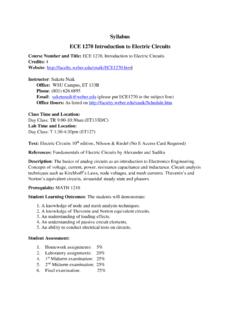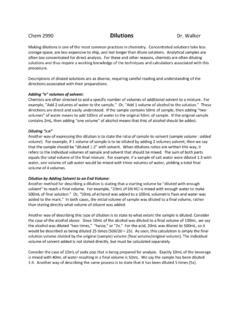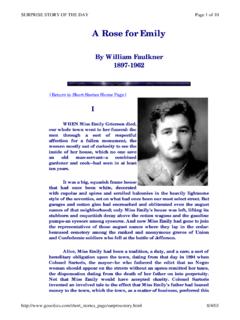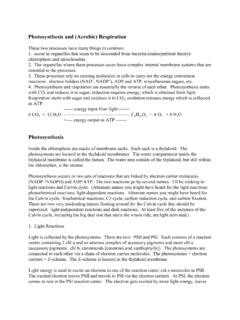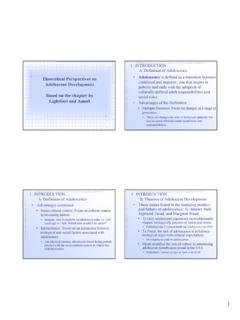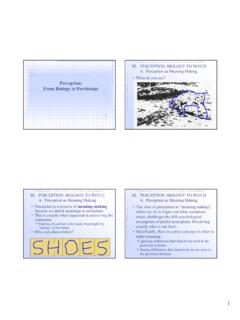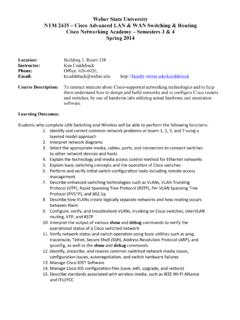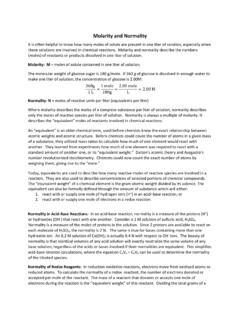Transcription of Writing a Good Conference Paper - Weber State University
1 Writing a good Conference PaperBecause they are both written and read aloud, Conference papers present unusual problems for the writer. When we are only Writing an essay, the concerns we have are different sometimes in kind, sometimes in degree from when we write essays that will be read aloud. Suddenly, we must be concerned with pacing, with rhythm, with vocabulary, with other words, with a whole host of things we don't normally have to worry about when we're just composing texts that will never be read aloud.
2 It seems reasonable, then, to divide this discussion into two sections: Writing and reading. I WritingIntroductionsThe most important thing to remember about introductions is that they introduce the topic. When you are composing a Conference Paper , this is to some extent more important than it would be otherwise, since your audience can't stop listening to you and go and look something up. It's up to you to set up the context, parameters and facts of your a "real" Conference setting, you cannot be sure about whether or not your audience is familiar with the text you're speaking about, so there are special considerations with regard to that.
3 For our purposes, you can assume that everyone in your audience will have some degree of familiarity with your subject. Bear in mind, however, that it is something of a courtesy for you to provide at least some kind of summary of the text you'll be talking about even if it is just a few sentences. That's usually enough. Just give us the broadest outlines of the text you'll be talking about. The assumption is that you'll provide a little summary as you move through your there has been a great deal of scholarship on the text you are discussing, you will likely need to acknowledge this.
4 This is important for a number of reasons. First, it suggests to your audience that you know what you're talking about and you're not just shooting off about something without having done any research on it. Second, it helps orient your audience into the broader discussion of the text. They know, then, that this isn't some random book off the shelves that no one has ever taken seriously. Third, and finally, it locates what you have to say within the context of the larger discussion about the text. You can accomplish this pretty easily.
5 Consider the way that Herbert Tucker dispenses with it in the essay I asked you all to read:[Goblin Market] proves on recent examination to be a poem about communal sorority and also about patriarchal dominion; about the Christian Eucharist and also free self-actualization; about diffusive jouissance and also the therapeutic consolidation of a split soul; about anorexia nervosa, vampirism, the adulteration of foodstuffs, absinthe addiction, and the pros and cons of masturbation. (117)With just a few lines, Tucker has summarized the major trends in the scholarship on "Goblin Market.
6 " Note how he does not go into tremendous detail; he merely lays out the themes. Remember: you have a limited amount of space, and so you don't want to waste it discussing context that is not of use to you or your most important thing about your thesis is that it should be clear and explicit. This is the crucial point where you let your audience know precisely what you're going to be talking about. You might even consider giving them a sense of what the structure of your Paper will be. For example:Webster's social and political thought merits close attention, however, and in this Paper I would like to examine some of her arguments about the fallen woman.
7 In her poem "A Castaway" (1869), the speaker "Eulalie" advances a remarkably materialist challenge to conventional notions of the fallen woman (such as those advanced by moralist, evangelical would-be reformers who saw themselves combating the Great Social Evil), and demonstrates that these conventional descriptions of the fallen woman fail to describe in any recognizable way actual prostitutes and fallen women. In this brief space, then, I want to accomplish three things. First, I want to sketch very briefly some of Webster's arguments from her essays in the Examiner in order to establish a sense of the ways she challenged conventional notions of the fallen woman.
8 Second, I want to discuss the materialist arguments contained in "A Castaway," paying special attention to the ways these arguments challenge conventional descriptions of the fallen woman and pave the way for her rejection of the moral framework traditionally describing the figure. Third, and finally, I want to discuss some of the implications of these arguments for both the representation of the fallen woman in literature as well as in the Victorian conception of the figure. This is a great deal to do in a short span of time, and although I can do little more than graze he surface here, we can, I think, gain a clear sense of the significance of Webster's arguments to studies of the fallen how this paragraph provides a clear sense of the subject to be discussed and, more importantly, provides a fairly good sense of how that discussion is going to unfold.
9 Additionally, note how this introduction uses the pronoun "I." While I would like you to be very careful about your use of "I," there is nothing wrong with it. As I have said in class, it would be silly to pretend that you are not a person reading a Paper . But if you use "I," you should do so you write, you will need to be concerned with how you present your evidence. Remember, your audience does not have access to your Paper , and so it is important for you to help the audience along. For example:Its stagnant waters, stirring there no springOf life or wholesomeness; yet were they stirred.
10 Now would I speak with her, the fire was kindled;Long had it smouldered, long enough consumed by its flashes she shall read my soulMethought, and look upon me as I am.. (200-08) The passage describes both the fallen woman's resistance to Christina's kindness as well as the beginnings of the fallen woman's process of reclamation, but, notably, Christina's kindness results in no immediate, miraculous, revitalization but her efforts do, at least, stir the waters. As she describes, even though Christina's kindness fails to bring about some "spring / Of life or wholesomeness; yet they were stirred" (203-04).


